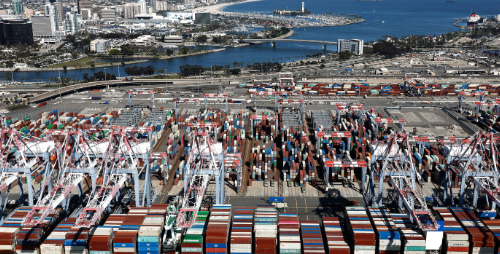Beijing/Brussels/Washington: China and the European Union (EU) on Wednesday escalated their responses to President Donald Trump’s tariffs on foreign goods, announcing new trade restrictions targeting US products.
China raised its tariff on American imports to 84%, up from the previous 34%, following the implementation of Trump’s hefty 104% tariffs on Chinese goods.
Meanwhile, the EU introduced 25% tariffs on a variety of US imports, marking the first phase of its countermeasures.
The EU had already faced a range of US duties, including a 20% tariff on most products and higher charges on cars and steel.
This sharp escalation comes as other countries, including Canada, Japan, and several smaller nations like Madagascar, also started imposing retaliatory tariffs. The United States, now applying an average tariff rate of over 20%—a sharp rise from around 2.5% before Trump’s presidency—has triggered a global chain reaction that threatens to unravel decades of established trade agreements.
JPMorgan’s CEO, Jamie Dimon, warned that the trade wars could lead to a recession, which would further strain global markets. Stocks tumbled sharply, causing trillions of dollars to evaporate from equity markets. Oil prices plunged, reaching their lowest point in four years, while the US dollar, often seen as a safe haven, lost value.
The turmoil extended beyond traditional markets and into corporate funding sectors, where borrowing costs spiked even for companies with minimal risk.
As a result of the intensifying trade standoff, Japan and Canada offered to work together to stabilize the global financial system, a role that has traditionally been filled by the US during periods of crisis.
However, Trump remained unfazed, claiming that the tariffs would ultimately benefit the American economy and boasting that they were pressuring foreign leaders to seek negotiations. On social media, he assured that everything would "work out well," despite the rising turmoil.
While Trump insists the tariffs are essential for rebuilding the US industrial base, he expressed openness to negotiating trade terms with individual countries, even suggesting that such talks could address issues like military aid. Already, Trump has engaged in discussions with leaders from Japan, South Korea, and is set to meet with a Vietnamese delegation.
Amid this, China has shown no sign of backing down, making it clear that it is prepared to continue the trade battle if Trump persists with his tariffs. In addition to the new duties, Beijing imposed restrictions on several US companies, including those in defense industries. China’s economy has been under pressure, with its currency facing downward pressure, though reports suggest the central bank is intervening to prevent significant declines in the yuan.
The impact of these trade disruptions is already being felt across industries, particularly in the US retail sector. For example, American suppliers of holiday ornaments from China, which dominate the market, have reported delays and a lack of orders.
Meanwhile, US stock indexes showed small gains as investors sought cheaper tech stocks, though overall market performance remained poor. Since Trump unveiled the tariffs earlier in April, the S&P 500 suffered some of its most significant losses in history.
Economists warn that the tariffs could result in significant cost increases for average American households, potentially adding thousands of dollars to the annual cost of living.
This could become a political problem for Trump, who had campaigned on reducing living costs. Polls show that a significant majority of Americans expect prices to rise as a result of the tariffs.
As businesses face these increased costs, some have already begun to raise prices, although the full effects of the tariffs may take time to materialize. Retail giants like Walmart have maintained their sales forecasts for the year but have committed to keeping prices as low as possible.
Back in Washington, the debate over the tariffs continues to divide political leaders. Some Democratic officials have criticized the sweeping measures as overly aggressive, while others, such as Michigan Governor Gretchen Whitmer, have argued that tariffs should be implemented more judiciously, like using a scalpel rather than a hammer.


